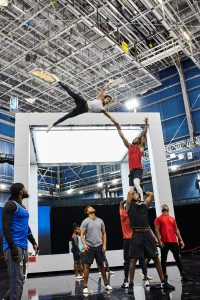By Angela Kryhul, Editor, ADRENALIN

Royal Albert Hall in 2023
Photo: Cirque du Soleil/Mathew Tsang
André Lachance, baseball coach, author, university professor and performance specialist, joined Cirque du Soleil earlier this year as director, human performance services. Lachance spent 21 years with Baseball Canada, most recently as business, sport development and women’s national team director. An expert in leadership, team coaching and group efficacy, Lachance describes how he made the transition from sport coaching to the magical world of circus arts.
Why did you make the move from baseball to Cirque du Soleil?
Cirque du Soleil was looking for someone to oversee and harmonize a team of coaches, which includes acrobatic, artistic and mental coaches, strength training, physiotherapists and nutritionists. We ensure that the artist is always at the centre of everything we do on a daily basis so that we help optimize performance and durability. That’s something I’ve done before, coaching baseball. While this is a totally different environment, at the end of the day it’s about putting the right people around the table to collaborate, work as a group, communicate properly and align strategies.
How does coaching circus performers—some of whom have competed in Red Bull Crashed Ice competitions—compare to coaching pro and amateur athletes?
When athletes arrive at Cirque du Soleil, they become artists. We need to teach them how to behave on stage, how to look, walk, smile and how to have a presence. That’s a teachable skill. The interaction that artists have with the public is really, really important. You have to feel like they’re performing just for you. When you watch a hockey game, on the other hand, the end goal for the players is to win the game.
In sports, an athlete may have played 80 games during a season, but at Cirque they may perform over 400 shows a year. There’s a big difference between the two, so we need to work on their endurance. The mental part is similar in the sense that just as an athlete needs to be mentally prepared to play tennis or volleyball, a performer needs to be mentally ready to perform day in and day out.

Photo: Cirque du Soleil
How are curiosity and losing one’s fear of failure important for growth and success?
If you look at Cirque du Soleil overall, curiosity and making the shows bigger year after year have always been part of the DNA. And when you look at the success of different business organizations, curiosity and learning are often key values. Curiosity and trying to do things differently have always driven me as a person and as a coach. As for fear of failure—if you’re curious enough to try something new and if you value the fact that you will fail along the way as an integral part of learning, then you’re going to have success at some point.
Curiosity and celebrating failure are really tied together—if you’re not willing to fail, you’ll never discover. This is how you grow and become better. This is highly important for any organization, athlete or performer who wants to get to the next level.
What advice do you have for coaches and other leaders about taming their ‘advice monster’?
This concept comes from Michael Bungay Stanier [author of The Advice Trap and The Coaching Habit]. In sports, coaches are very quick to give advice and instructions versus letting the athlete figure out the issues and the solutions. The parallel at Cirque is how can we make the artists a little bit more autonomous so that they don’t rely on coaches too much when they’re out on the road performing and are figuring out the answers by themselves. I think all coaches need to become better at asking better questions so that the athlete relies less on the coach on a daily basis, because when it’s time to change, when it’s time to adapt, if you always have to rely on someone else, you’ll never be successful.
Published December 2022




